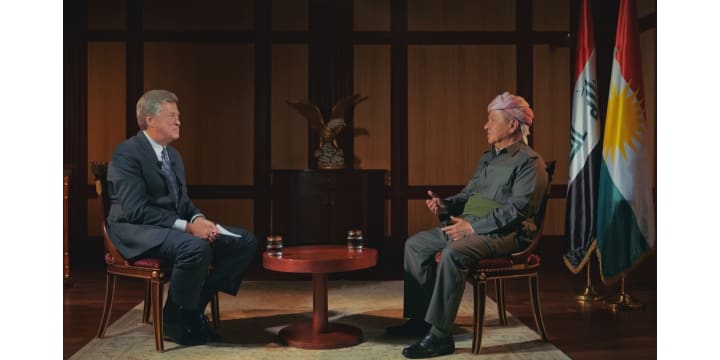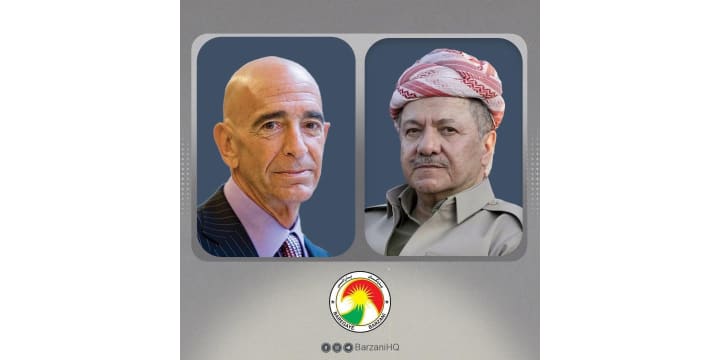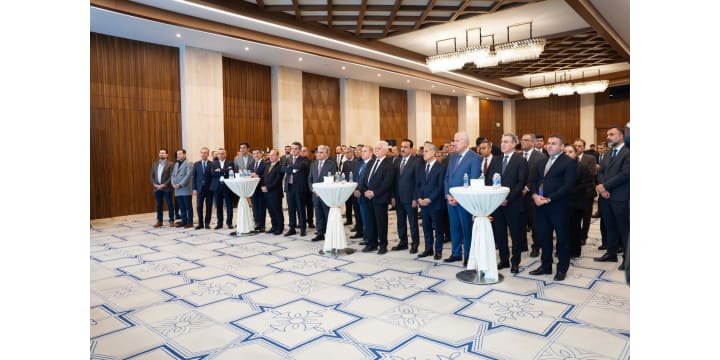
The Kurdish people have endured profound suffering and have faced numerous atrocities throughout our long struggle, including the Anfal Campaign and chemical attacks
Interview with President Barzani: A Legacy of Struggle and Resilience
Tim Constantine:
Mr. President, thank you for joining us today.
Your life has been defined by a relentless effort to uphold the interests of the Kurdish people, a mission that has shaped not only your life but also that of your entire family. I would like to ask you about the profound influence of your father. Could you share some of your earliest memories with him and how his presence shaped you into the leader you are today?
President Barzani:
My father had a tremendous impact on me, but for your knowledge, when he went to the former Soviet Union, I was just six months old. He returned when I was 12 years old. However, the history of our family's struggle predates that period and begins with my uncle, Sheikh Abdulsalam, who advocated for the rights of the Kurdish people and equality in the early 20th century. He was executed by the Ottomans in 1914. Since that day, our family's struggle has been unyielding and unwavering.
Tim Constantine:
You have witnessed war, oppression, and unimaginable suffering. Yet, today we stand in a Kurdistan that is vibrant and full of life. How did you manage to maintain hope through those dark times? What kept you moving forward to achieve what we see today?
President Barzani:
Indeed, the Kurdish people have endured profound suffering and have faced numerous atrocities throughout our long struggle, including the Anfal Campaign and chemical attacks. However, despite these tragedies, the Kurdish people never lost hope, this progress we see today is a testament to the sacrifices of thousands of our youth and the collective resilience of our nation. We are immensely proud of what has been achieved because we know that no one handed it to us, it was earned through the blood and sacrifices of our martyrs.
Tim Constantine:
Today, we see universities across Kurdistan, teaching advanced subjects in various fields. For our American audience who may not be familiar with Kurdistan, can you tell us what you would like them to know about this region and its aspirations?
President Barzani:
We are an ancient nation in this region, existing long before many others. However, throughout history, the Kurdish nation has been repeatedly betrayed, especially after World War I. We were divided without being consulted on whether we wanted to remain within certain borders or pursue independence. While we understand that changing this reality is not simple, it does not mean that the Kurdish people should be perpetually deprived of their rights.
The Kurdish people have endured oppression for generations. We advocate for a peaceful approach where Kurds in every part of the region should enjoy their rights within the framework of the existing states. However, these rights should not be denied indefinitely.
Tim Constantine:
Syria is your neighbor, and the country has recently witnessed a change in leadership. What can you tell us about the new Syrian leader?
President Barzani:
Certainly, the changes in Syria were somewhat expected, but the speed and manner in which they occurred were surprising. This represents a significant shift and a pivotal moment in the region’s history. We are all aware of the background of the current Syrian leadership.
In light of these developments, we sought to unify the Kurdish stance in Syria to present a common position and unified demands to the new Syrian government. On November 26, a conference was held in Qamishlo, where Kurdish representatives gathered to consolidate their stance.
Tim Constantine:
Let’s discuss Iran. You were born in Iran, and throughout your life, relations with Iran have experienced many ups and downs. How would you characterize the current state of relations between the Kurdistan Region and Iran?
President Barzani:
Indeed, I was born in Mahabad. Iran is a significant country in the region and a direct neighbor of the Kurdistan Region. We have never sought conflict with Iran; our aim has always been to maintain a relationship based on mutual respect and shared interests.
At times, relations have been strained, but at present, they are stable and positive. However, we do not wish to be drawn into any regional conflicts involving Iran and other actors. Our focus remains on safeguarding the stability of our region.
Tim Constantine:
You mentioned mutual respect, which also applies to the United States-Iran relations. These relations have been strained for as long as I can remember. Now, we see that the Trump administration has entered negotiations with extreme caution, and both sides appear wary and distrustful of one another. What is your perspective on the ongoing negotiations?
President Barzani:
Our principle has always been that it is far better to resolve disputes through dialogue than through conflict. We hope that the ongoing talks will lead to positive outcomes that benefit not only the United States and Iran but all nations in the region. A peaceful resolution would be a victory for regional stability and security.
Tim Constantine:
President Trump insists that any agreement must ensure a nuclear-free Iran. Is this a reasonable demand by the United States?
President Barzani:
The recent statements coming from both sides appear to be somewhat contradictory. While I am not deeply versed in the specifics of the nuclear issue, our position remains the same — we advocate for resolving such disputes through constructive dialogue, not coercion.
Tim Constantine:
Speaking of the United States-Kurdistan relations, I recall reading an interview with you eight or nine years ago, where you expressed uncertainty about the nature of the relationship. There were many challenges at the time. You also had a recent phone conversation with Secretary of State Rubio, and last week, you met with a US envoy here. How would you describe the current state of relations with the United States?
President Barzani:
Let us be honest — if you had seen Erbil 20 or 30 years ago, it would have been an entirely different city. The transformation we see today would not have been possible without the intervention of the United States in 1991. Their support provided us the opportunity to rebuild our country. The United States was notably impressed by how the Peshmerga forces were able to defeat ISIS, but our relationship with the US has seen its ups and downs. Our current relationship is good, but we certainly hope for further strengthening and closer cooperation.
Tim Constantine:
During your lifetime, you have had the opportunity to meet with popes, global leaders, and influential figures around the world. However, none seem to be quite like Donald Trump. What is your perception of President Trump?
President Barzani:
Unfortunately, I have not had the chance to meet President Trump, but it is evident that he has a distinct way of conducting affairs, quite different from his predecessors. We hope he succeeds in his endeavors, as his success will ultimately benefit the American nation.
Tim Constantine:
The United States has formed a negotiating team with Qatar and Egypt, aiming to broker a lasting agreement to end the conflict and establish peace in Gaza. Given your experience with conflict and peacemaking, what advice would you offer to the United States and other countries engaged in this effort?
President Barzani:
It is clear to everyone that what the United States can accomplish globally, no other country can. This conflict is undoubtedly a tragedy. The best course of action is to prioritize dialogue, negotiations, and diplomatic engagement to bring about a sustainable peace.
Tim Constantine:
Let me rephrase that. The Kurdish people have faced countless challenges — oppression, genocide, and tyranny — and yet they have emerged stronger, with a flourishing economy and a spirit of resilience. What lessons can the people of Gaza learn from Kurdistan’s journey and achievements?
President Barzani:
The Kurdish people possess a profound culture of coexistence, mutual respect, and acceptance. Throughout our history, we have not had religious conflicts with other nations, religions, or sects. This culture has helped us endure unimaginable atrocities.
For instance, during the Anfal Campaign, 180,000 of our people went missing. The chemical attack on Halabja claimed the lives of 5,000 women and children within seconds. It wasn’t just Halabja; chemical bombs were dropped across the whole of Kurdistan. Thousands of Failis disappeared. 8,000 members of the Barzan tribe also vanished. In total, 180,000 people were unaccounted for, most of them women and children.
Despite such unimaginable suffering, our people remained steadfast, holding on to our culture of tolerance and perseverance. Sometimes, conflict is inevitable, and you have to defend yourself, but even in such times, our people never abandoned their principles of acceptance and coexistence. This is a valuable lesson that Gaza can draw from our experience.
Tim Constantine:
I initially framed the question in the context of learning from your successes. Let’s focus on some of those achievements. The economy in Kurdistan appears vibrant and thriving. As I walk through Erbil, I see remarkable progress, continuous activity, and a palpable sense of optimism and peace. How did you achieve such impressive economic development after all the suffering endured?
President Barzani:
A person must truly love their country, and the Kurdish people have consistently demonstrated that love through their actions. Both those working in the private sector and the Kurdistan Regional Government have made tremendous efforts to rebuild our homeland.
I used to visit those devastated villages and think that it would be impossible to rebuild them. But now, when I go back and see those same areas, it is astonishing to witness the transformation. The villages and towns have been completely rebuilt, and it is hard to believe how far we have come.
Our land is incredibly rich in resources, but we have not been given the opportunity to fully utilize its wealth. For instance, Iraq relies heavily on Kirkuk oil, which is essentially Kurdistan’s oil.
When we went to Baghdad, the Kurdistan Regional Parliament decided to create a new Iraq with the support of the United States, its allies, and our friends. The constitution was drafted in 2005. I am not saying it is flawless, but it was a significant step forward.
However, since 2014, we have faced severe challenges: Baghdad cut the budget, oil prices plummeted, the COVID-19 pandemic struck, and we were engaged in a relentless war against ISIS. All of these factors have hindered our progress and slowed down development. Yet, despite these setbacks, the true source of our resilience lies in the courage and determination of our people.
Tim Constantine:
You have emphasized the importance of education, not just in the cities but also throughout the region. Why is this such a priority for you, and how is it being implemented?
President Barzani:
Education is the cornerstone of progress for any nation. Without schools, universities, and access to learning, there can be no advancement in science or knowledge.
Even during the September Revolution, when our people were under severe attacks and relentless air bombings, we ensured that schools remained operational. Despite the dire conditions, we believed that educating our people was crucial, not just for the present but for the future of Kurdistan.
Tim Constantine:
I would like to mention a name and get your immediate reaction: George W. Bush.
President Barzani:
President George W. Bush is a great friend, not just to me personally but to the entire Kurdish nation. He stood by us during critical times and demonstrated unwavering support.
Tim Constantine:
One of the things I have consistently heard since arriving here — not only from the Kurdish people but also from those who have moved here from other places — is the distinct Kurdish culture. Everyone says, “Tim, do you love Kurdish culture? The Kurds are incredibly hospitable and good-hearted people.” What does this cultural identity mean to you?
President Barzani:
Because the Kurds have not had the freedom to work openly in politics, business, and other fields, they have channeled much of their energy into preserving and developing their culture. Culture became the medium through which we expressed our identity, aspirations, and resistance. It became the core of our existence and a powerful tool to maintain our national identity despite the challenges we have faced.
Tim Constantine:
In the United States, particularly in Hollywood, people are drawn to stories of victory against all odds, tales of the oppressed who endure unimaginable hardships but ultimately emerge victorious. Your life story closely resembles this narrative. You have faced countless challenges and passed through some very difficult stages. Yet, here we are in 2025, witnessing the achievements and progress of Kurdistan. If we look back, the journey has been incredibly difficult, but we are now at a point of success. Looking forward, where do you hope Kurdistan will be in 10 to 20 years.
President Barzani:
I have always believed that the right to self-determination is a natural right for every nation, including the Kurdish nation. It is a fundamental right that should be respected and acknowledged. As for the future, I am not advocating for the use of force to achieve our objectives in the next ten years or beyond. I believe in pursuing our goals through peaceful and diplomatic means, aiming for stability, prosperity, and recognition of our rights.
Tim Constantine:
Our final question touches on the essence of human nature. Often, we reflect on our existence, our achievements, and the legacy we leave behind. You are known for being a very down-to-earth and modest leader. You have provided Kurdistan with a path forward and created opportunities for progress. When you look back on your life and the long, arduous struggle, do you feel a sense of pride and fulfillment? Are you satisfied with where Kurdistan stands today?
President Barzani:
I have never done anything in my life that I was not fully convinced of, therefore, when I look back, there is nothing I regret. However, with the power of hindsight there were many situations if I had known what I know now, I might have acted differently.
The uprising was a turning point that gave the Kurdish people another opportunity to break free from oppression. That was one of the happiest periods of my life, it was a time of hope and a time when the Kurdish people reclaimed their dignity.
When I was a child, around ten or twelve years old, those were also good times, innocent and carefree, but still filled with the spirit of struggle. The uprising, however, was a profound and transformative moment for our people. It gave us hope and a renewed sense of purpose.
Tim Constantine:
Thank you very much for your time, Mr. President. It was an absolute pleasure speaking with you.
President Barzani:
Thank you very much as well. I greatly appreciate the opportunity to share our story.

